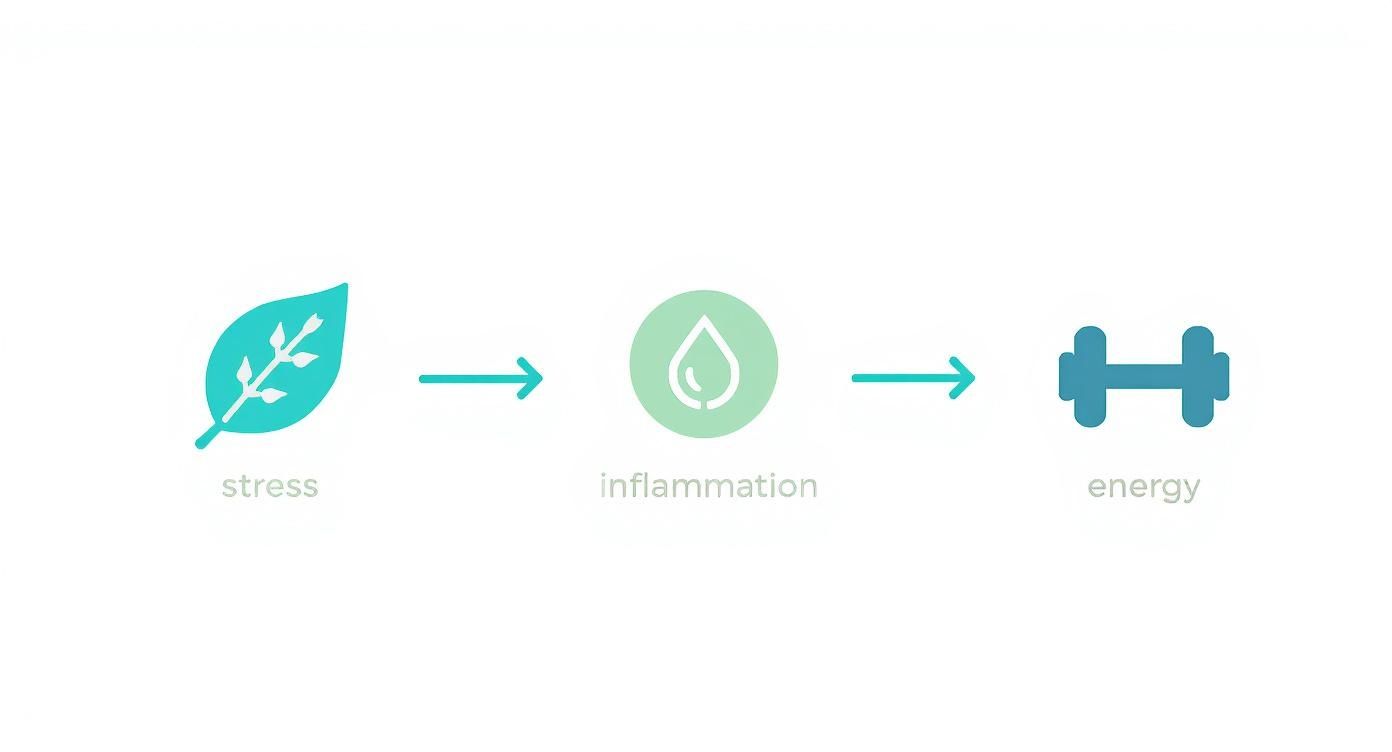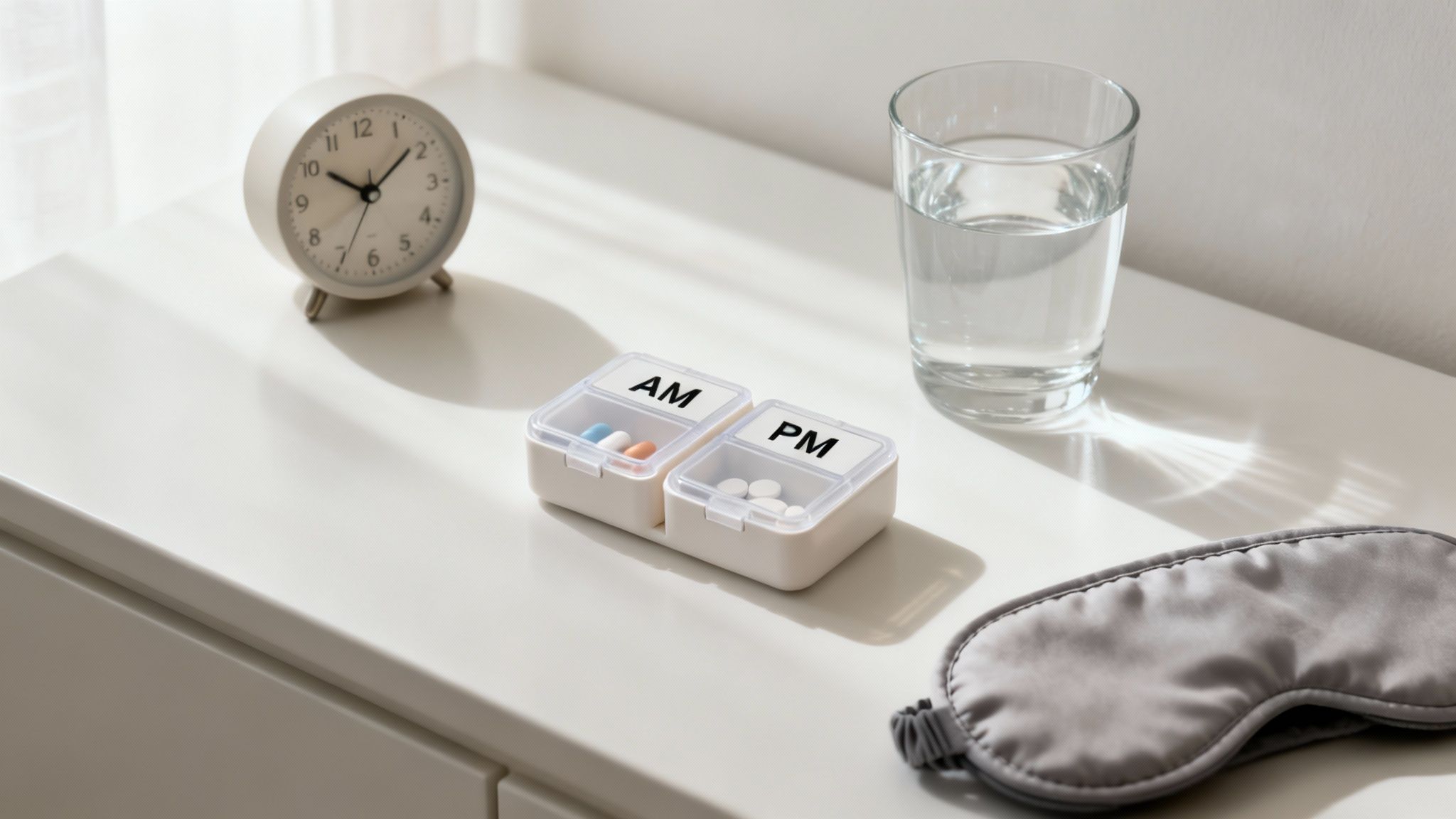
A UK Guide to Balancing Hormones with Supplements
Share
That nagging feeling of being off? It’s often a quiet signal from your body that your hormones are out of sync. Bringing them back into line can feel like a huge challenge, but understanding how to balance hormones with supplements is a fantastic place to start. Think of key players like magnesium, omega-3s, and adaptogens such as ashwagandha as the foundational support crew for your body’s intricate endocrine system. They help manage stress, cool down inflammation, and nudge you back towards equilibrium.
Why Hormonal Balance Is Key to Your Wellbeing

Hormones are your body's chemical messengers, tiny but mighty. They travel through your bloodstream to every tissue and organ, directing everything from your metabolism and sleep patterns to your mood and reproductive health. Imagine them as the diligent managers of a complex factory—when they’re all working in harmony, the whole system runs like a dream.
But when these messengers get their wires crossed, the effects can ripple through your entire body. We call this a hormonal imbalance, and it’s way more common than you’d think. Things like chronic stress, a less-than-ideal diet, not enough sleep, and even toxins in our environment can throw this delicate communication network into chaos.
Common Signs Your Hormones Are Off Kilter
The first step to fixing the problem is realising there is one. So many of us brush off these symptoms as just the side effects of a busy, modern life, but they often point to a deeper issue that needs attention.
Do any of these sound familiar?
- Persistent Fatigue: That bone-deep tiredness that no amount of sleep seems to fix.
- Mood Swings: Feeling irritable, anxious, or just plain sad for no apparent reason.
- Stubborn Weight Gain: Struggling to shift weight, especially around your middle, no matter how well you eat or how much you exercise.
- Cognitive Fog: Having trouble concentrating, forgetting things, or just feeling mentally sluggish.
- Sleep Disturbances: You can’t fall asleep, you wake up in the middle of the night, or you get up feeling like you haven’t slept at all.
These symptoms aren't just annoyances; they're your body's way of telling you something needs to be recalibrated. To dig deeper and get a truly holistic picture, a functional medicine approach can be incredibly insightful, as it looks at the root causes and how all your body's systems interact.
The Role of Supplements in Hormonal Support
While lifestyle habits are the bedrock of hormonal health, targeted supplements can give your body the specific raw materials it needs to produce and regulate hormones properly. They aren't a magic pill, but they can be powerful allies on your journey to feel your best again.
Take your adrenal glands, for instance. They pump out the stress hormone cortisol and rely on a steady stream of B vitamins and magnesium to do their job. When you're constantly stressed, your body chews through these nutrients at a much faster rate, creating a shortfall that can lead to adrenal fatigue and throw other hormones off balance, too.
Supplements step in to fill these nutritional gaps, offering targeted support right where your endocrine system needs it most. They help your body become more resilient to stressors and maintain the delicate hormonal symphony required for optimal health.
Here’s how key supplements can lend a hand:
- Managing Stress: Adaptogens like ashwagandha are brilliant for helping your body adapt to stress, which in turn can help keep cortisol production in check.
- Reducing Inflammation: Omega-3 fatty acids are vital for building healthy cell membranes, which allows hormones to communicate clearly. They also fight the chronic inflammation that we know is a major hormone disruptor.
- Providing Building Blocks: Your body can't even make hormones without certain vitamins and minerals. A good quality multivitamin ensures you've got these fundamental nutrients on hand.
Getting your head around this 'why' is crucial. It’s not about just popping pills; it’s about strategically giving your body what it’s missing so it can regulate itself and truly thrive. This is the foundation for making smart, informed choices about what’s right for your unique body.
This article is for informational purposes only and is not medical advice. Always consult a qualified health professional before starting any new supplement or major lifestyle change.
The Best Supplements for Hormonal Balance
Walking down the supplement aisle can feel like a guessing game, but when it comes to hormonal health, a few key players consistently deliver results. The goal isn't a quick fix, but to give your body the specific building blocks it needs to find its own equilibrium.
And it’s clear people are looking for these solutions. The UK dietary supplements market, especially for products designed to balance hormones with supplements, hit a massive £3.8 billion in 2024. Projections show it more than doubling by 2033, which tells us there’s a huge shift towards taking proactive control of our health. Vitamin complexes are right at the forefront of this movement. You can dive deeper into these market trends in the full report on UK dietary supplement growth from grandviewresearch.com.
Let's break down which supplements actually move the needle and how they work.
Ashwagandha and Magnesium for Stress and Cortisol Control
If you're constantly running on stress, your adrenal glands are likely in overdrive, pumping out cortisol. Over time, chronically high cortisol can throw nearly every other hormone out of whack, from your thyroid to your sex hormones. This is where ashwagandha and magnesium can be game-changers.
Ashwagandha is what’s known as an adaptogen. In simple terms, it helps your body get better at managing stress. It doesn’t just numb you out; it helps regulate your physiological response to stressors, creating a sense of calm and stopping cortisol from running the show. Think of it like a smart thermostat for your stress response.
Magnesium is the unsung hero here. This mineral is involved in over 300 different processes in the body, including those that keep your nervous system and adrenal function in check. A surprising number of people in the UK don't get enough of it, which can manifest as heightened anxiety and poor sleep—a perfect recipe for spiking cortisol.
- A practical tip: When choosing a magnesium supplement, look for Magnesium Glycinate. It’s incredibly well-absorbed and gentle on the stomach, unlike other forms like magnesium oxide. Taking it in the evening is particularly brilliant for promoting deeper, more restful sleep.
Omega-3 Fatty Acids: The Building Blocks of Hormones
Believe it or not, every single hormone in your body is made from fats and cholesterol. That’s why healthy fats are absolutely non-negotiable for hormonal balance. Omega-3 fatty acids, especially the EPA and DHA found in good-quality fish oil, are the superstars.
They form the very foundation of your cell membranes, which allows hormones to communicate effectively with their target cells. On top of that, omega-3s are powerful anti-inflammatories. Since chronic inflammation is a major hormone disruptor, keeping it under control is essential for everything to run smoothly.
A good omega-3 supplement provides the raw materials your body needs to build hormones and creates an anti-inflammatory environment where they can do their job properly.
Creatine for Energy and Testosterone Support
Often typecast as a supplement for bodybuilders, creatine actually has some impressive benefits for hormonal health, especially for men. Its main job is to help with cellular energy production, which is a fundamental process for everything your body does, including making hormones.
More specifically, some research suggests creatine can support healthy testosterone levels. By boosting energy within the cells of the testes, it may help optimise testosterone production. And for anyone who trains regularly, it also helps with muscle recovery, which in turn helps manage the cortisol spike that can come from intense exercise. To specifically address sex hormone balance, you may also find products focused on testosterone boosters and estrogen blockers to be relevant.
Multivitamins and Mushroom Blends: Foundational Support
While targeted supplements are great, you can't build a strong house on a weak foundation. A high-quality multivitamin is your daily nutritional insurance policy. It ensures you're topped up on all the essential co-factors—like B vitamins, vitamin D, and zinc—that are crucial for every step of hormone production.
To take that foundation a step further, consider adaptogenic mushroom blends. Varieties like Reishi, Lion’s Mane, and Cordyceps work together to bolster your body’s overall resilience.
- Reishi: Known for its calming effects and its ability to support the adrenal glands.
- Cordyceps: Often used to boost energy and athletic performance, reducing physical stress.
- Lion’s Mane: Supports brain and nerve health, which are intricately linked to the endocrine system.
By combining these targeted and foundational supplements, you’re creating a robust support system. You’re not just patching up specific imbalances; you’re fortifying your body’s innate ability to regulate itself and thrive. If you're interested in how specific minerals work together, you can learn more by reading our guide on the benefits of taking zinc and magnesium supplements.
This article is for informational purposes only and is not medical advice. Always consult a qualified health professional before starting any new supplement or major lifestyle change.
Building a Supplement Plan for Your Body and Lifestyle
When it comes to hormone balance, there’s no such thing as a one-size-fits-all magic pill. Your hormonal needs are as unique as you are. The real key to success is building a plan that actually fits your specific life stage, goals, and daily demands. This is where we move from theory to a practical, personalised action plan.
A generic approach just doesn't cut it. Think about it: the hormonal landscape of a 25-year-old woman training for a marathon is worlds away from that of a 45-year-old man navigating a high-pressure career. Your age, sex, and lifestyle are the most important filters for choosing the right supplements.
This infographic breaks down a simple framework for matching supplements to your body's core needs, zeroing in on stress, inflammation, and energy.

It shows how your lifestyle can point directly to specific supplement solutions, creating a clear path from a daily challenge to targeted support.
The following table provides a quick guide to help you start thinking about which supplements might align with your current needs, whether you're dealing with age-related changes, specific health goals, or the demands of your gender.
| Life Stage / Goal | Primary Hormonal Concern | Recommended Supplements | Key Considerations |
|---|---|---|---|
| Young Women (20s-30s) | Menstrual cycle regularity, PMS, stress | Magnesium, Omega-3s, Ashwagandha, B-Complex | Focus on stress management and anti-inflammatory support. Consistency throughout the month is key. |
| Perimenopause (Late 30s-40s) | Fluctuating oestrogen, progesterone, cortisol | Maca, Black Cohosh, Magnesium, Vitamin D | Adaptogens can help smooth out hormonal peaks and troughs. Prioritise sleep and nervous system support. |
| Post-menopause (50+) | Low oestrogen, bone density, heart health | Calcium, Vitamin D, Vitamin K2, Omega-3s | Bone and cardiovascular health become top priorities. Ensure adequate intake of foundational nutrients. |
| Men (30+) | Declining testosterone, high cortisol | Zinc, Vitamin D, Ashwagandha, Creatine | Support testosterone naturally by managing stress and optimising foundational nutrients like zinc and vitamin D. |
| High-Stress Lifestyle | Elevated cortisol, adrenal fatigue | Ashwagandha, Rhodiola, L-Theanine, Magnesium | Adaptogens help buffer the body's stress response. Magnesium can calm the nervous system, especially at night. |
| Active/Athletic Individuals | Recovery, inflammation, energy production | Creatine, Omega-3s, Turmeric, Electrolytes | Focus on reducing exercise-induced inflammation and supporting cellular energy for optimal performance. |
| Fertility Support (All) | Reproductive hormone balance | CoQ10, Folate (methylfolate), Zinc, Selenium, Omega-3s | Both partners can benefit. Focus on antioxidants to protect egg and sperm quality and nutrients for hormone production. |
This table isn't exhaustive, but it's a solid starting point for tailoring your approach. It helps you connect the dots between what's happening in your life and the specific support your body might be asking for.
Tailoring Supplements for Women Through Life Stages
A woman’s hormonal journey is incredibly dynamic, with needs shifting dramatically over time. A smart supplement strategy respects and supports these natural transitions.
For many, managing the monthly menstrual cycle is a priority. During this time, hormonal dips and spikes can trigger mood swings, cramping, and fatigue. The right supplements can offer targeted relief:
- Magnesium: Often called "nature's relaxant," magnesium is fantastic for easing menstrual cramps by relaxing the uterine muscles. It’s also a great ally for mood and sleep.
- Omega-3s: Their powerful anti-inflammatory properties can help dial down the painful prostaglandins linked to period pain.
As women enter their late 30s and 40s, they approach perimenopause—a transitional phase where hormones like oestrogen and progesterone can fluctuate wildly. This is when symptoms like hot flushes, night sweats, and brain fog might start to appear. Here, adaptogens and foundational nutrients become even more vital to help smooth the transition.
The goal during perimenopause isn’t to stop the process, but to support your body’s resilience, helping it adapt more gracefully to these hormonal shifts. A well-rounded multivitamin and consistent stress support are non-negotiable.
Post-menopause brings a new set of priorities, shifting the focus to bone density, cardiovascular health, and maintaining vitality. A high-quality multivitamin with plenty of vitamin D and calcium is crucial, while omega-3s continue to support heart and brain health. For a more detailed guide, you can explore our article covering key supplements for women's health at every age.
A Man's Guide to Hormonal Vitality
For men, the hormonal conversation often revolves around maintaining healthy testosterone levels, managing stress, and sustaining energy and muscle mass, especially after 30.
Testosterone naturally begins to decline by about 1-2% per year from a man's late 20s. While this is a normal part of ageing, a sharp drop can hit your energy, mood, and body composition hard.
A proactive supplement plan can offer significant support:
- Creatine: This is so much more than a muscle-builder. Creatine supports cellular energy production, which is fundamental for hormone synthesis. It’s a reliable ally for maintaining strength and vitality.
- Ashwagandha: By helping to buffer the body's stress response, ashwagandha can prevent cortisol from putting a dent in your testosterone levels.
Matching Your Stack to Your Lifestyle
Beyond just age and sex, your daily habits and stressors are huge clues for personalising your supplement stack. Let’s walk through a couple of real-world examples.
Scenario 1: The High-Stress Professional
You work long hours at a demanding desk job and often feel wired but tired. Your main challenges are high cortisol and mental fatigue.
- Primary Support: Ashwagandha to help your body manage stress and regulate cortisol.
- Secondary Support: Magnesium in the evening to promote restful sleep and calm your nervous system. A mushroom blend with Lion's Mane could also support cognitive function.
Scenario 2: The Dedicated Gym-Goer
You’re in the gym four to five times a week, pushing your body hard. Your focus is on recovery, performance, and building lean muscle.
- Primary Support: Creatine to fuel your workouts and support muscle recovery.
- Secondary Support: Omega-3s to manage exercise-induced inflammation and support joint health. An energy powder with electrolytes can also be beneficial pre- or intra-workout.
By layering these considerations—age, gender, and lifestyle—you create a strategy that’s truly built for you. This isn't about guessing; it's about listening to your body and giving it the precise support it needs to thrive.
This article is for informational purposes only and is not medical advice. Always consult a qualified health professional before starting any new supplement or major lifestyle change.
How to Time and Dose Your Supplements for Real Results

So, you've picked out the right supplements for your goals. That's a great start, but the work isn't quite done. To actually move the needle on your health, it’s not just what you take, but when and how you take it. Strategic timing and the right dose can be the difference between seeing real results and feeling like you're just wasting your money.
Think of it like tending a garden. You wouldn't water your plants in the scorching midday sun or chuck seeds into frozen ground. It's the same with your body. Aligning your supplement intake with your body's natural rhythms ensures each nutrient is delivered at the perfect moment for maximum impact.
Morning Rituals for Energy and Focus
The morning is all about setting the stage for the day. You want to support your body's natural cortisol awakening response and fire up your metabolism. Any supplements designed to boost energy and cognitive function are best taken early on.
This is the perfect time for your energy powders or a high-quality multivitamin. Taking these with your first meal gives your body the essential B vitamins and other co-factors it needs for energy conversion, helping you start your day feeling sharp and ready to go.
- Creatine: If you're using creatine for its performance and cognitive benefits, getting into the habit of taking your daily 3-5 grams in the morning is a smart move. It ensures your muscle cells are saturated with phosphocreatine, ready to fuel whatever the day throws at you.
Mealtime Maximisers for Better Absorption
Some vitamins are fat-soluble, which is just a technical way of saying they need a bit of fat to be properly absorbed by your body. If you just swallow them with a glass of water on an empty stomach, you’re simply not going to get their full benefits.
Try to schedule these supplements with a meal that contains healthy fats like avocado, nuts, seeds, or olive oil:
- Omega-3 Fatty Acids: These are fats themselves, so taking them with food is a natural fit. It can also help prevent any of that unpleasant fishy aftertaste.
- Vitamins A, D, E, and K: These are all fat-soluble and often come together in a comprehensive multivitamin. Just check the label and plan to take it with a meal.
By pairing your supplements with the right foods, you're not just taking them—you're activating them. This simple habit dramatically improves bioavailability, ensuring more of the good stuff gets to where it needs to go.
Evening Wind-Down for Stress Relief and Recovery
As your day winds down, your supplement strategy should shift towards promoting relaxation, recovery, and restorative sleep. This is absolutely crucial for managing cortisol and giving your body the chance to repair itself overnight.
Magnesium is the undisputed star of the evening routine. Taking it an hour or two before bed can help calm the nervous system, ease muscle tension, and support the production of melatonin, the sleep hormone. It’s a simple act that helps regulate your body's stress response while you rest. For more specific advice, you can learn more about the best time to take magnesium in our guide.
Ashwagandha also fits perfectly into an evening schedule. While some people take it in the morning to help manage daytime stress, an evening dose can help lower cortisol levels before bed. This can prevent that "wired but tired" feeling that so often keeps people staring at the ceiling.
It's clear that more people are looking for ways to manage their hormonal health. Recent data from the UK shows a sharp increase in hormone replacement therapy prescriptions, with around 7.8 million issued between 2021 and 2022 alone. This represents a 35% rise from the previous year, signalling a growing awareness of just how important hormonal balance is.
By thoughtfully timing your supplements, you create a powerful daily rhythm that supports your hormones around the clock. You enhance energy when you need it and promote deep rest when you don't, giving your body the consistent support it needs to find its natural balance.
This article is for informational purposes only and is not medical advice. Always consult a qualified health professional before starting any new supplement or major lifestyle change.
Beyond Supplements: Lifestyle Habits for Better Hormones

While targeted supplements can be incredibly powerful allies, they don't work in a vacuum. To truly balance hormones with supplements, you need to see them as just one part of a much bigger, more holistic picture. The best results always come from combining smart supplementation with foundational lifestyle habits that create an environment where your hormones can genuinely thrive.
Think of it like this: your supplements are the specialist team you bring in to fix a specific problem. Your daily habits, however, are the foundation of the house. If that foundation is shaky, even the best specialists will be fighting an uphill battle. It's all about creating a synergy where your day-to-day actions amplify the benefits of what you're taking.
This isn't about chasing some impossible ideal of perfection or overhauling your life overnight. Far from it. It’s about making small, consistent changes that stack up over time to produce real, lasting results.
Mastering Your Stress Response
If there’s one major villain in the story of hormonal imbalance, it's chronic stress. When you're constantly stuck in "fight or flight" mode, your body prioritises pumping out the stress hormone cortisol. This comes at the expense of other crucial hormones, like progesterone and testosterone, throwing the whole system out of whack.
This is exactly why adaptogens like ashwagandha are so popular—they help your body better manage that stress response. But you can give them a massive boost with some simple, daily stress-reduction practices.
- Mindfulness and Meditation: You don't need to sit for an hour. Just five to ten minutes of daily mindfulness can work wonders for calming your nervous system and dialling down cortisol. It’s like training your brain to be less reactive to whatever life throws at it.
- Time in Nature: It sounds simple, but spending time outdoors has been scientifically shown to lower cortisol levels. A quick walk in a park on your lunch break isn't just a nice idea; it's a genuine hormonal health strategy.
- Digital Detox: Constant pings, notifications, and endless scrolling keep your nervous system on high alert. Setting clear boundaries, like putting your phone away an hour before bed, is one of the most restorative things you can do.
These habits help create a calmer internal state, giving your adrenal glands a much-needed break and allowing your hormones to find their natural rhythm again.
Fuelling Your Body with a Whole-Foods Diet
What you put on your plate provides the literal building blocks for your hormones. A diet packed with processed foods, sugar, and unhealthy fats is a recipe for inflammation, which disrupts the delicate communication lines between your hormones and your cells.
On the other hand, focusing on a diet rich in whole, nutrient-dense foods gives your body the exact raw materials it needs to get the job done right.
Your plate is one of the most powerful tools you have for hormonal balance. Every meal is an opportunity to either fuel inflammation and disruption or provide the nutrients your endocrine system needs to function optimally.
A whole-foods approach doesn't need to be complicated. Just try to prioritise these key components:
- Healthy Fats: Think avocado, olive oil, nuts, and seeds. These are absolutely essential for hormone production.
- Quality Protein: Including lean protein like chicken, fish, eggs, and legumes with every meal helps keep your blood sugar stable, which is crucial for hormonal harmony.
- Fibre-Rich Carbohydrates: Veggies, fruits, and whole grains provide the fibre your gut needs to stay healthy and help your body efficiently clear out excess hormones.
The demand for solutions to hormonal issues is huge. In the UK, the hormone replacement therapy (HRT) market is a massive sector, with treatments for menopause making up the largest segment at a 59.53% revenue share in 2024. The market is projected to grow at 8.3% annually through to 2033, which just goes to show how many people are actively seeking ways to manage their hormonal health. You can find out more about the UK hormone replacement therapy market growth on grandviewresearch.com.
The Impact of Movement and Sleep
Consistent, moderate exercise is fantastic for your hormones. It improves insulin sensitivity, boosts mood-lifting endorphins, and helps keep cortisol in check. The key word here is balance—pushing yourself too hard with intense exercise can actually add more stress to your body, so listen to what it needs.
Finally, never, ever underestimate the power of a good night's sleep. Your body does most of its hormonal regulation and repair work while you're resting. Aiming for seven to nine hours of quality, uninterrupted sleep is one of the most impactful things you can possibly do for your endocrine system. This is where supplements like magnesium can be a game-changer, but they work best when paired with solid sleep hygiene.
This article is for informational purposes only and is not medical advice. Always consult a qualified health professional before starting any new supplement or major lifestyle change.
Got Questions About Hormone Supplements? Let’s Clear Things Up
Embarking on any new health journey, especially one involving supplements, naturally brings up a few questions. Feeling a bit curious or even slightly cautious is completely normal—in fact, it’s smart. Getting clear on any uncertainties is the final step to feeling confident and ready to take charge of your hormonal health.
Let's dive into some of the most common queries we hear, so you can move forward safely and effectively.
How Long Until I See a Difference?
Patience really is a virtue when it comes to balancing hormones. Unlike a painkiller that kicks in quickly, supplements are working to support your body's natural rhythms. This isn't an overnight fix; it's a process of building up nutrient levels and helping your system gently recalibrate.
Many people start to notice subtle shifts in things like their energy, mood, or sleep quality within four to six weeks of consistent use. For more deep-rooted imbalances, it could take up to three months to really feel the full benefits. Consistency is everything here.
Is It Safe to Combine Different Supplements?
This is a great question. "Stacking" supplements can be a powerful strategy, but it needs to be done thoughtfully. The goal is synergy—making sure your chosen supplements work together to enhance their effects, not cancel each other out or lead to an overload of one nutrient.
For example, taking magnesium and ashwagandha together in the evening is a classic combination for tackling stress and improving sleep. The magnesium works to calm the nervous system, while the ashwagandha helps regulate cortisol. What you want to avoid is accidentally doubling up on ingredients, which can happen with complex formulas like pre-blended powders or some multivitamins.
As a rule of thumb, it’s always best to introduce new supplements one at a time. Give it a week or two. This lets you see how your body responds to each one individually before you add something else into the mix.
If you're ever in doubt, the smartest move is to run your full supplement list by a qualified health professional. They can spot any potential conflicts you might have missed.
What Are the Potential Side Effects?
Most of the foundational supplements we’ve talked about—like magnesium, omega-3s, and B vitamins—are incredibly well-tolerated when you stick to the recommended doses. When side effects do pop up, they’re usually minor and often related to a bit of digestive upset.
For instance, certain forms of magnesium can have a laxative effect. That's why we're big fans of magnesium glycinate, which is known for being gentle on the stomach and highly absorbable.
With herbs like ashwagandha, sticking to the suggested dose is crucial. While it’s rare, taking huge amounts could lead to an upset stomach or drowsiness. This is why choosing high-quality products from reputable brands and simply following the label is so important.
Should I Take a Break from My Supplements?
This really depends on the supplement in question. The practice of "cycling"—taking something for a set period and then pausing—is quite common, especially with certain botanicals.
- Adaptogens (like Ashwagandha): Some experts recommend cycling adaptogens. A common approach is taking them for three months, then taking a month off. The idea is that this helps keep your body responsive to their effects.
- Foundational Nutrients (like Magnesium, Omega-3s): These are different. Because they fill common gaps in our diets, they are generally considered safe and beneficial for continuous, long-term use.
Ultimately, the best guide is your own body. If you’ve reached your goals and are feeling fantastic, you could experiment with a short break (ideally under professional guidance) to see how you feel without them.
Ready to stop guessing and start building a supplement plan that's perfectly aligned with your body's needs? The VitzAi quiz uses smart insights to analyse your unique health goals, age, and lifestyle, delivering a personalised supplement report in minutes. Discover the exact nutrients you need to feel your best. Take the free VitzAi quiz today and get your personalised recommendations!
This article is for informational purposes only and is not medical advice. Always consult a qualified health professional before starting any new supplement or major lifestyle change.
